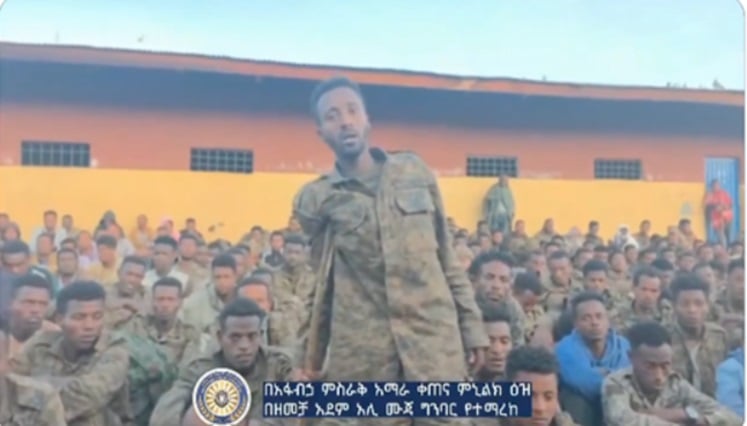By The Habesha News Desk
October 2, 2025

Testimony from Captivity
Ethiopian National Defense Force (ENDF) soldiers captured by Amhara Fano fighters have broken their silence, challenging the government’s official narrative of the ongoing conflict.
በአማራ ፋኖ ብሔራዊ ኃይል ምስራቅ አማራ ቀጠና ምኒልክ ዕዝ በዘመቻ አርበኛ አደም አሊ (አባ ናደው) የተማረኩ የመከላከያ ሠራዊት አባላት
ክፍል አንድ pic.twitter.com/rrEqFcxMC2— እቴጌ 👑🦅 (@ruhama__12) October 2, 2025
Speaking to Ethio 251 Media, one soldier described the anguish of separation from his family and the circumstances of his capture.
“It’s been five years since I joined the ENDF. The longing for home is unbearable. My family misses me dearly, and I miss them terribly—my son, my father, and my mother. I was captured by Fano on September 24, 2025.”
The soldier’s statement directly contradicts government claims that Fano is incapable of capturing ENDF troops. Instead, he asserted, “over 300 ENDF soldiers are currently being held captive by Fano.”
Between Propaganda and Reality
For months, Ethiopian state media has dismissed Fano as fragmented vigilantes incapable of mounting serious resistance. The government has insisted that only Fano fighters are captured, never ENDF troops.
But testimonies emerging from the battlefield paint a different picture.
“They used to say being captured by Fano meant certain death,” the soldier said. “But my experience has been different.”
An Oromo Soldier’s Perspective
Adding an unexpected dimension, the soldier identified himself as Oromo — highlighting a dynamic that defies the ethnic divisions often emphasized in Ethiopia’s wars.
“As an Oromo, I have had a surprising experience. Fano has been taking care of me since my capture. Many of my friends fell in battle, but by the grace of God, I survived. Now, my only desire is to see my son again.”
This testimony runs counter to the government’s portrayal of Fano as a violent ethnic militia, instead suggesting moments of humane treatment by its fighters.
Fano’s Evolution: From Local Defenders to Organized Resistance
Fano’s roots stretch back decades as loosely organized Amhara youth defense groups. Initially focused on protecting local communities, their role expanded significantly during the 2020–2022 Tigray conflict, when they fought alongside federal forces.
But by 2023, relations with Addis Ababa collapsed. The federal government outlawed Fano, branding it a destabilizing force. In response, Fano transformed into a broad-based resistance movement. Today, it is capable of coordinated campaigns, capturing territory — and now, ENDF troops — despite heavy government operations.
ENDF in Crisis
The soldier’s words also shed light on a deeper malaise within Ethiopia’s national army.
“The ENDF is plagued by corruption, and it’s no secret that nobody wants to remain in the force,” he said.
Reports of desertions, unpaid salaries, poor logistics, and disillusionment among rank-and-file troops have long circulated. The government’s growing reliance on drones and foreign military contractors underscores the army’s weakness.
A Plea for Humanitarian Access
Perhaps the most urgent part of the soldier’s account was his call for outside intervention.
“The Red Cross should reach us before the government hits us with a drone.”
In recent months, humanitarian organizations have struggled to access contested areas of Amhara. At the same time, reports of indiscriminate drone strikes have intensified, raising fears that captured soldiers and civilians alike are at risk.
International Reactions
Global human rights organizations have expressed mounting concern over the conduct of Ethiopia’s war.
-
Amnesty International has warned that “indiscriminate tactics place both soldiers and civilians at grave risk.”
-
Human Rights Watch has criticized the ENDF’s lack of transparency, noting “captives remain invisible in official accounts, raising fears of mistreatment and denial of humanitarian aid.”
-
The International Committee of the Red Cross (ICRC) has reiterated its commitment to assist captives but says “lack of cooperation from authorities” limits access.
-
The United Nations Office of the High Commissioner for Human Rights (OHCHR) has called for independent investigations into abuses by all parties, but the Ethiopian government has so far resisted outside scrutiny.
The Human Cost
This testimony underscores the profound human cost of Ethiopia’s ongoing war. Families are torn apart, soldiers are disillusioned, and narratives crafted in Addis Ababa collapse in the face of battlefield realities.
The soldier’s voice — an Oromo captive of an Amhara resistance — challenges simplistic portrayals of Ethiopia’s war as one of ethnic divides. Instead, it exposes a deeper crisis: a government unwilling to admit vulnerabilities and an army increasingly fractured from within.
Conclusion
While the Ethiopian government insists on total victory, the voices of its own captured soldiers tell a different story — one of survival, disillusionment, and urgent appeals for peace.
Until these voices are acknowledged, Ethiopia risks sinking further into a cycle of propaganda, denial, and tragedy — with ordinary soldiers and civilians paying the highest price.
